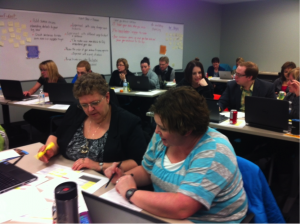by Cathy Herrick
“Writing is a core skill for living, not just for school” (Kittle, 2014). This belief underlies the Living Sky School Division’s purpose for a focus on writing. Students, like adults, write for a variety of purposes and for a variety of audiences, and for many it is hard, hard, work. Teachers across all curriculum areas have students write to share their ideas, check for understanding, problem solve, and to explore their thinking.
 The Living Sky School Division set a goal two years ago to support the enhancement of student writing across all grades. Many schools have also established their own writing school goal. Professional development activities, regular and focussed teacher conversations about writing, and the implementation of a variety of strategies have all been some of the ways teachers have sought to improve their instruction and students’ achievement. In an effort to provide teachers and students with some specific feedback from a division perspective, a small sample of student writing from grades 3, 6, 9, and 12 is collected every year from all schools. Teachers from each of these grades meet once a year (May) to collaboratively score hundreds of pieces of students’ writing from across the school division. Every student’s work is assessed by two different teachers using a four point rubric. This specific feedback is returned to each student for reflection. Data collected from the collaborative scoring days is collated and returned to schools to guide planning for the upcoming year. Division wide data is organized to provide a picture of how well our students are achieving curriculum expectations for writing and to guide supports for the upcoming year.
The Living Sky School Division set a goal two years ago to support the enhancement of student writing across all grades. Many schools have also established their own writing school goal. Professional development activities, regular and focussed teacher conversations about writing, and the implementation of a variety of strategies have all been some of the ways teachers have sought to improve their instruction and students’ achievement. In an effort to provide teachers and students with some specific feedback from a division perspective, a small sample of student writing from grades 3, 6, 9, and 12 is collected every year from all schools. Teachers from each of these grades meet once a year (May) to collaboratively score hundreds of pieces of students’ writing from across the school division. Every student’s work is assessed by two different teachers using a four point rubric. This specific feedback is returned to each student for reflection. Data collected from the collaborative scoring days is collated and returned to schools to guide planning for the upcoming year. Division wide data is organized to provide a picture of how well our students are achieving curriculum expectations for writing and to guide supports for the upcoming year.
Through the collaborative scoring process teachers have commented that meeting together to assess students’ writing provides an invaluable opportunity to discuss students’ common strengths, weaknesses, and the strategies that are working to close gaps and improve writing. Assessing the work of other students across the division also provides a common understanding of expectations for proficient writing at a variety of grade levels.
Time well spent? Students write every day to learn, to share stories, opinions, and ideas, and to demonstrate their thinking and understanding. Writing is a life skill that requires explicit instruction, lots of practice, timely and specific feedback, and lots of encouragement. Parents, teachers, and community members want to see children succeed, and the skill of writing for a variety of purposes and audiences is important. Teachers working together, students working together, and parents, children, and teachers working in partnership yield the result of a community that writes to understand and to be understood.
